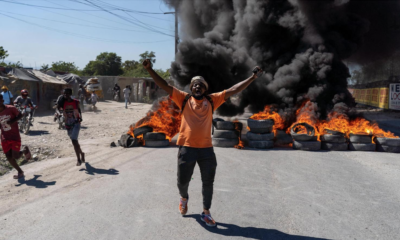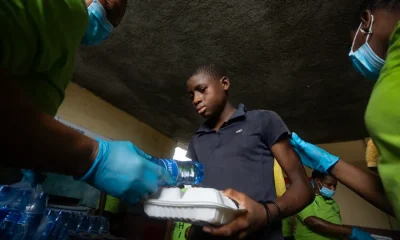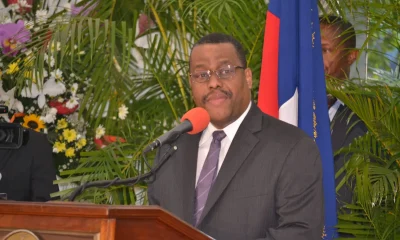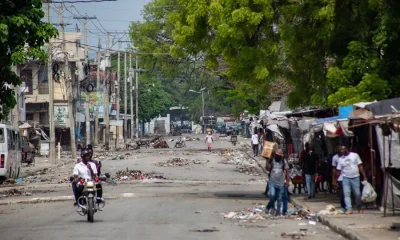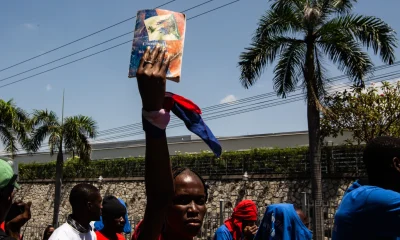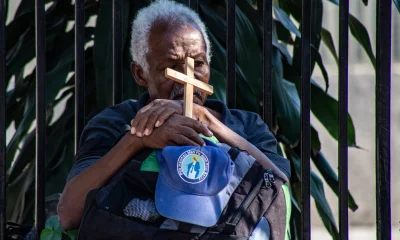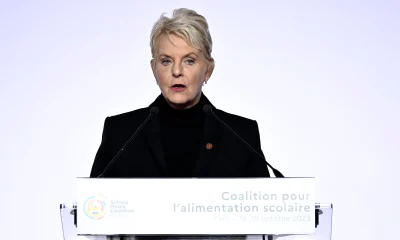International
Haiti’s most powerful gang leader proposes to lay down his arms in pursuit of a national dialogue
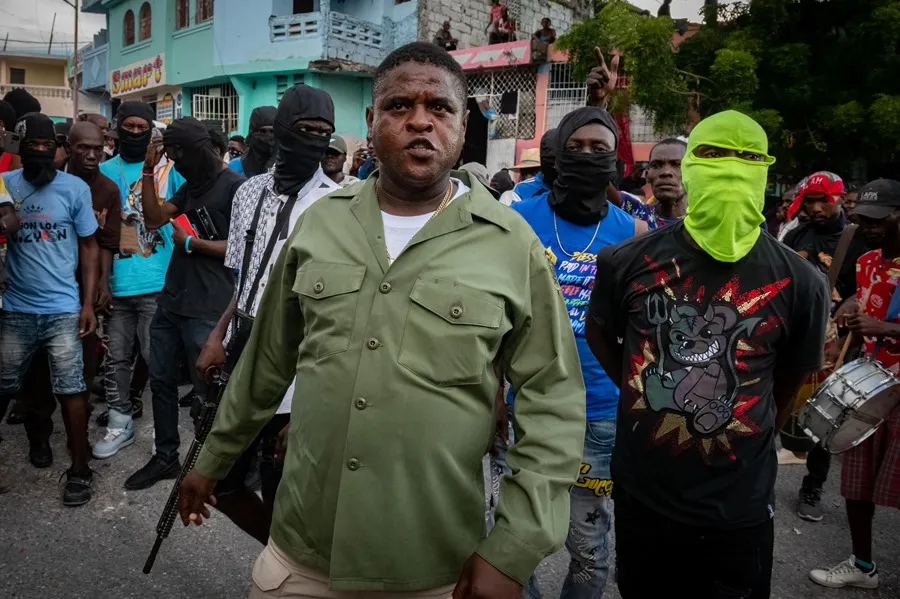
Former police officer Jimmy Cherisier, alias ‘Barbecue’, the most powerful armed gang leader in Haiti, proposed this Friday to Prime Minister, Garry Conille, to lay down his arms in an attempt to engage in a national dialogue with a view to recovering peace.
“We have decided to publicly announce that our strategy of laying down arms to facilitate national dialogue and promote peace is already written in black and white on our agenda,” Cherisier, who leads the coalition of armed gangs Vivre Ensemble (Living Together), told the media.
With a red garnet jacket and glasses, it was another Barbacue who appeared before the press today, with a written speech.
A man who usually allows himself to be seen armed and prepared for combat, this time showed a different tone and gestures, repeating again and again his call to national dialogue.
“We are willing to choose a credible and coherent Haitian citizen in the diaspora to facilitate dialogue in order to end this mafia war and facilitate the path to peace in the country,” Barbecue insisted.
Too many divisions, discord and conflicts between local actors have led the international community to look for Garry Conille and put him as prime minister, he recalled, denouncing the “political and economic mafia that keeps the country kidnapped.”
“We want peace because we want to destroy the war. We want dialogue because we want peace. All those who do not want dialogue sat in the war,” said the leader of the most powerful gangs in the country.
According to Barbecue, the weapons used by his men have been put in their hands by “personalities,” who have also sold them weapons.
The former policeman admitted to having made “several mistakes” in his activities as a gang leader.
“Why won’t this man, Dr. Garry Conille, take advantage of the national dialogue to end the war and bring peace back to the whole country?” he wondered.
According to Cherisier, the prime minister must clearly understand that national dialogue is the only way to ensure that the country does not follow the same course that it has tridled so far.
“Only through national dialogue will the Haitian State be able to regain control of the country’s territories, as required by the current Constitution,” said Barbecue, who did not cease to praise Conille’s merits.
He also affirmed that armed gangs should be considered rebel forces, not gangs.
“Let’s focus on the real solution, which is the national dialogue, where every Haitian, without discrimination, has the right to speak. And that’s what the mafias don’t want. They don’t want dialogue because they want to continue with the war,” he said, without identifying those “mafias.”
Barbacue, a powerful gang leader, has received accusations of committing several massacres, murders and homicides in the country. His name Barbecue comes from the fact that he burned his adversaries in an oven once they were captured.
The last crime committed by the leader of the gang – which he himself has claimed – was the murder of three police officers from the Elite Anti-Pang Unit (UTAG, in French) of the National Police in his bastion of Delmas 18, Sans Fil, on Sunday, June 9.
The ex-police is at the head of the two most powerful coalitions of armed gangs in Haiti, the G9 and the GPEP.
Last February, the armed coalition Vivre Ensemble created a situation of terror in Haiti, facing the police, destroying and burning police stations and expelling thousands of residents from their homes. The center of Port-au-Prince is totally destroyed due to the terror of the armed gangs, which dominate much of the capital.
A first contingent of police officers from Kenya have been in Port-au-Prince for more than a week, as part of an advance of 1,000 agents from that country who, together with members of security forces from other nations, will form a multinational mission to help the Haitian authorities regain control of the country.
International
U.S. Senate Rejects Budget, Bringing Government Closer to Shutdown Amid DHS Dispute

The U.S. Senate voted on Thursday against a budget proposal in a move aimed at pressuring changes at the Department of Homeland Security (DHS), following the killing of two civilians during a deployment of immigration agents in Minneapolis.
All Senate Democrats and seven Republican lawmakers voted against the bill, which requires 60 votes to advance, pushing the country closer to a partial government shutdown that would cut funding for several agencies, including the Pentagon and the Department of Health.
The rejection came as Senate leaders and the White House continue negotiations on a separate funding package for DHS that would allow reforms to the agency. Proposed measures include banning Immigration and Customs Enforcement (ICE) agents from wearing face coverings and requiring them to use body-worn cameras during operations.
The vote took place just hours after President Donald Trump said he was “close” to reaching an agreement with Democrats and did not believe the federal government would face another shutdown, following last year’s record stoppage.
“I don’t think the Democrats want a shutdown either, so we’ll work in a bipartisan way to avoid it. Hopefully, there will be no government shutdown. We’re working on that right now,” Trump said during a Cabinet meeting at the White House.
International
Trump Says Putin Agreed to One-Week Halt in Attacks on Ukraine Amid Extreme Cold

U.S. President Donald Trump said on Thursday that he secured a commitment from Russian President Vladimir Putinto halt attacks against Ukraine for one week, citing extreme weather conditions affecting the region.
“Because of the extreme cold (…) I personally asked Putin not to attack Kyiv or other cities and towns for a week. And he agreed. He was very pleasant,” Trump said during a Cabinet meeting broadcast by the White House.
Trump acknowledged that several advisers had questioned the decision to make the call.
“A lot of people told me not to waste the call because they wouldn’t agree. And he accepted. And we’re very happy they did, because they don’t need missiles hitting their towns and cities,” the president said.
According to Trump, Ukrainian authorities reacted with surprise to the announcement but welcomed the possibility of a temporary ceasefire.
“It’s extraordinarily cold, record cold (…) They say they’ve never experienced cold like this,” he added.
Ukrainian President Volodymyr Zelensky later commented on the announcement, expressing hope that the agreement would be honored.
International
Storm Kristin Kills Five in Portugal, Leaves Nearly 500,000 Without Power

Storm Kristin, which battered Portugal with heavy rain and strong winds early Wednesday, has left at least five people dead, while nearly half a million residents remained without electricity as of Thursday, according to updated figures from authorities.
The revised death toll was confirmed to AFP by a spokesperson for the National Emergency and Civil Protection Authority (ANPEC). On Wednesday, the agency had reported four fatalities.
Meanwhile, E-Redes, the country’s electricity distribution network operator, said that around 450,000 customers were still without power, particularly in central Portugal.
Emergency services responded to approximately 1,500 incidents between midnight and 8:00 a.m. local time on Wednesday, as the storm caused widespread disruptions.
The Portuguese government described Kristin as an “extreme weather event” that inflicted significant damage across several regions of the country. At the height of the storm, as many as 850,000 households and institutions lost electricity during the early hours of Wednesday.
Several municipalities ordered the closure of schools, many of which remained shut on Thursday due to ongoing adverse conditions.
Ricardo Costa, regional deputy commander of the Leiria Fire Brigade, said residents continue to seek assistance as rainfall persists.
“Even though the rain is not extremely intense, it is causing extensive damage to homes,” he noted.
In Figueira da Foz, a coastal city in central Portugal, strong winds toppled a giant Ferris wheel, underscoring the severity of the storm.
-

 Central America4 days ago
Central America4 days agoGuatemala Police Arrest Prison Guard Caught in the Act of Extortion
-

 Central America4 days ago
Central America4 days agoHonduras swears in conservative president Asfura after disputed election
-

 Central America4 days ago
Central America4 days agoBukele leads public trust rankings as UCA survey highlights gains in security
-

 International3 days ago
International3 days agoFootball Fan Killed in Clashes After Colombian League Match
-

 International4 days ago
International4 days agoDoomsday clock moves to 85 seconds before midnight amid rising global risks
-

 Central America3 days ago
Central America3 days agoGuatemala President Says Starlink Terminal Found Inside Prison
-

 International2 days ago
International2 days agoU.S. Senate Rejects Budget, Bringing Government Closer to Shutdown Amid DHS Dispute
-

 International4 days ago
International4 days agoWinter Storm Fern Leaves 30 Dead and Over One Million Without Power Across the U.S.
-

 Sin categoría4 days ago
Sin categoría4 days agoEight Killed in Series of Armed Attacks in Ecuador’s Manabí Province
-

 International4 days ago
International4 days agoSpain approves plan to regularize up to 500,000 migrants in Historic Shift
-

 International3 days ago
International3 days agoMissing Spanish Sailor Rescued After 11 Days Adrift in Mediterranean
-

 International3 days ago
International3 days agoRubio Says U.S. Could Participate in Follow-Up Russia-Ukraine Talks
-

 Sin categoría4 days ago
Sin categoría4 days agoEl Salvador Launches Fourth Year of Ocean Mission to Protect Marine Ecosystems
-

 Central America24 hours ago
Central America24 hours agoPanama Supreme Court Strikes Down Panama Ports Concession as Unconstitutional
-

 International2 days ago
International2 days agoStorm Kristin Kills Five in Portugal, Leaves Nearly 500,000 Without Power
-

 Central America24 hours ago
Central America24 hours agoU.S. and Guatemala Sign Trade Deal Granting Zero Tariffs to Most Exports
-

 International2 days ago
International2 days agoMan Arrested After Vehicle Crashes Into Jewish Institution in Brooklyn
-

 International2 days ago
International2 days agoTrump Says Putin Agreed to One-Week Halt in Attacks on Ukraine Amid Extreme Cold

























